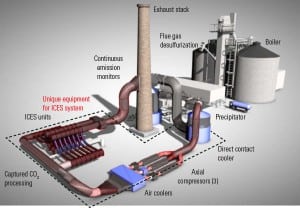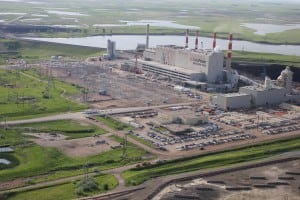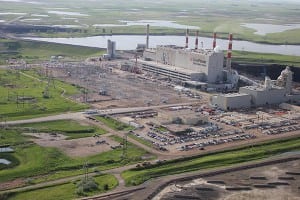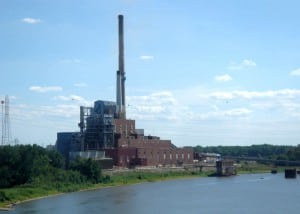CCS
-
Commentary
10 Million Tons of CO2 Stored
Our country’s energy landscape is rapidly changing. For the first time in decades we’re producing more barrels of oil in the United States than we import from other countries, thanks in part to shale oil production. Newly developed natural gas resources have enabled the U.S. to begin transitioning from a modest net importer of natural […]
Tagged in: -
Coal
Kemper Project Loses Key Power Buyer Due to Delays, High Costs
South Mississippi Electric (SME), an electric cooperative that has been Mississippi Power Co.’s (MPC’s) long-time backer in the development of the Kemper energy facility, has pulled out of the project, citing delays in project schedule and increased participation costs as reasons for its withdrawal. The cooperative that generates and transmits electricity for 11 member cooperatives […]
-
Coal
The Carbon Capture and Storage R&D Frontier
Given the costs and other concerns about currently available technologies for capturing and storing carbon dioxide from fossil-fueled power plants, interest in new technologies remains high. Here’s a look at some potentially promising approaches that are advancing the technology frontier. Frontiers represent the boundary between the known and the unknown. As researchers attempt to push […]
-
Power
DOE Highlights Carbon Capture Milestone
Carbon capture and storage (CCS) projects backed by the Department of Energy (DOE) have captured 10 million metric tons of carbon dioxide, the agency said in an announcement highlighting the milestone. The projects contributing to the 10 million tons captured milestone are part of DOE’s Regional Carbon Sequestration Partnership (RCSP) Initiative and the Industrial Carbon […]
-
Commentary
In a Word, Storage
What turns a trend from trendy to established? In the energy industry it can be any number of things, from a technology breakthrough, to a new market, to forces of nature. The shale gas boom in the U.S. is the most well-known example of a technology trend that has changed the economics for all power […]
-
Coal
MIT Study: Carbon Sequestration May Not Work as Advertised
According to a study funded in part by the U.S. Department of Energy (DOE) and conducted by Massachusetts Institute of Technology (MIT) researchers, a smaller portion of carbon dioxide (CO2) that is injected into the ground may be converted into rock than was previously presumed. The team, working in the Department of Earth, Atmospheric and […]
-
Power
DOE Backs Four Gasification Research Projects
Four industry-led projects will each receive about $16 million in federal funding to help them to significantly reduce the cost of producing hydrogen-rich syngas derived from fossil fuels and advance the gasification process for power generation and syngas production, the Department of Energy (DOE) announced on Nov. 6. “Gasification plants have the potential for greater […]
Tagged in: -
Coal
World’s First Post-Combustion CCS Coal Unit Is Online in Canada
The first full-scale commercial post-combustion carbon capture and sequestration (CCS) project at an operating coal-fired power plant is now online in Estevan, Saskatchewan, roughly 10 miles north of the U.S. border. The heart of the C$1.4 billion project at Boundary Dam Power Station is the rebuilt 110-MW Unit 3, originally commissioned in 1970. The project, […]
Tagged in: -
Legal & Regulatory
World’s First Post-Combustion CCS Coal Unit Online in Canada
The first full-scale commercial post-combustion carbon capture and sequestration (CCS) project at an operating coal-fired power plant is now online in Estevan, Saskatchewan, roughly 10 miles north of the U.S. border. The heart of the $1.4 billion project at Boundary Dam Power Station is the rebuilt 110-MW Unit 3, originally commissioned in 1970. The project, […]
-
Legal & Regulatory
EPA Approves Nation’s First Underground Injection Permits for Carbon Sequestration
The Environmental Protection Agency (EPA) on Tuesday granted the nation’s first four Class VI underground injection permits for carbon sequestration to the federally backed FutureGen 2.0 carbon-capture-and-storage (CCS) project. The Department of Energy formally committed $1 billion to the $1.68 billion project being developed by the FutureGen Industrial Alliance, a coalition of coal producers, users, […]







